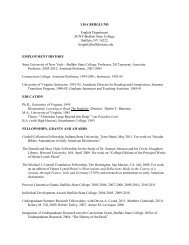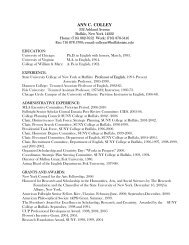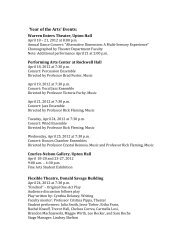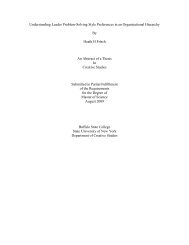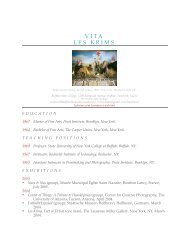POLITICS VERSUS SCIENCE: APPORTIONING ... - Buffalo State
POLITICS VERSUS SCIENCE: APPORTIONING ... - Buffalo State
POLITICS VERSUS SCIENCE: APPORTIONING ... - Buffalo State
Create successful ePaper yourself
Turn your PDF publications into a flip-book with our unique Google optimized e-Paper software.
1994; 1996a & b; 1999; 2000). Undoubtedly adopters of the latter view perceive a crisis<br />
in governing, the former, an Hegelian progression of ideas.<br />
Those who see and/or advocate policy networks cum multi-level governance cum<br />
the centrality of comitology, adopt the mantel of postnationalism by predicting<br />
(sometimes observing) the increasing irrelevance of the nation-state. To them,<br />
institutionalists build with the worn blocks of executive intra- and interstate regulatory<br />
agencies made accountable through legislative oversight. We see that postnationalists, 22<br />
influenced by a combination of enlightenment political philosophy (Kant) and<br />
homegrown experience (corporatism, conosociationalism), favor network governance.<br />
In her literature review Börzel (1998) finds this orientation almost exclusively<br />
among German and Dutch scholars. The Anglo-Saxon literature, on the other hand,<br />
while debating the usefulness of policy network literature to produce causal hypotheses 23<br />
regarding the nature of interactions among governmental institutional and non-<br />
governmental actors, limits its scope to that of interest intermediation. Rather than<br />
permanent constellations, policy networks (especially the loosely-structured issue<br />
networks first described by Hugh Heclo [1978]) emerge to coordinate fledgling policies.<br />
Over time, as governmental actors gain experience and knowledge in that policy sphere,<br />
the needs of interests (stability) and institutional actors (power), converge in a positive<br />
sum game. The institutional linkages and actor interactions evolve into a policy<br />
community or even the iron triangle [Cater 1964] (in the case of the once current notion<br />
of American circumvention of the separation of powers).<br />
22 See Archer (2002) for classifications, especially “Globalist.” For the linear development of this<br />
orientation, see Mitrany (1943), Haas (1964); Keohane and Nye (1977).<br />
23 See Dowding (1995) for criticisms of policy network as “theory” and Marsh and Rhodes (1992) for an<br />
example of advocacy of something beyond “approach.”<br />
26




